(AFP) Facing the growing ambitions of China in the Asia-Pacific region, the prime ministers of the United Kingdom and Japan will sign on Wednesday (11), in London, a defense agreement “of enormous importance” that will allow sending British troops to the Asian archipelago.
Ahead of the signing, scheduled for the historic Tower of London as part of a visit by Japanese Prime Minister Fumio Kishida, the office of his British counterpart, Rishi Shunak, declared that it is “the most important defense agreement between the two countries in more than a century.”
The pact, the negotiation of which began in 2021, establishes a legal basis for the presence of British and Japanese troops in their reciprocal territories – for training purposes and other operations.
“This mutual access agreement is of enormous importance to our two nations. It strengthens our commitment to the Indo-Pacific and highlights our joint efforts to boost the security economy,” Downing Street added.
The pact also reflects Japan’s efforts to strengthen its alliances in the face of China’s growing ambition in the region, which the Japanese Executive considers an “unprecedented strategic challenge” to its security.
Tokyo has recently revolutionized its defense and security policy – under growing pressure from Beijing – and already signed a similar agreement with Australia a year ago.
This enhanced military cooperation with London represents “a pretty significant step for both countries in terms of their bilateral defense relationship,” Euan Graham of the International Institute for Strategic Studies told AFP.
And it makes it easier to carry out joint operations that until now were “diplomatically complicated” because they required Foreign Ministry approval on each occasion, he explained.

“Block confrontation”
Chinese Foreign Ministry spokesman Wang Wenbin responded by saying that “the Asia-Pacific region is a place of peaceful development, not a stage for geopolitical games.”
“Defense cooperation should promote better mutual understanding, trust and cooperation among countries” and not “create imaginary enemies, much less introduce the old mindset of block confrontation in the region,” he added.
China and Japan, the world’s second and third largest economies respectively, are important trading partners, but their relations have been deteriorating for years. Tokyo regularly denounces Chinese maritime activity around the Senkaku Islands, whose sovereignty is claimed by Beijing.
Since the end of World War II, Japan has had a pacifist constitution that limits its military capabilities exclusively to defensive actions.
However, last month the government approved a plan to increase military spending to 2% of GDP by 2027 (double the usual rate) and warned that China is the biggest strategic challenge to its security.
The UK has also toughened its discourse toward Beijing. Sunak in November described the Asian giant as a “systemic challenge” to British interests.
Britain, Italy and Japan announced last month that they will jointly develop a next-generation fighter plane, which is expected to be ready by 2035.
Kishida is visiting London as part of a G7 multi-country tour that has already taken him to Paris and Rome and is due to culminate on Friday (13) with a meeting with US President Joe Biden in Washington.
*** Translated by the DEFCONPress FYI Team ***
